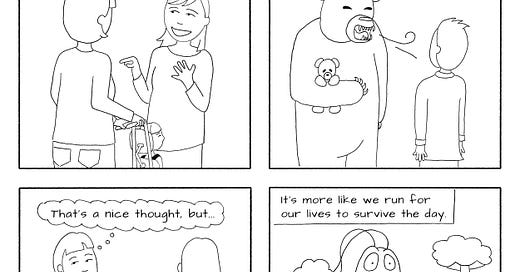The second Sunday of every month Medical Motherhood publishes Where Is the Manual for This?!, an editorial cartoon by Lenore Eklund. This month I needed to move it up to the first Sunday because: life!
Personally, I think I’m a cat. Fierce, independent but also more than willing to run and hide! What animal do you feel most represents you*? Let us know in the comments.
Medical Motherhood’s news round up
Snippets of news and opinion from outlets around the world. Click the links for the full story.
• From The Hill (opinion): “Simple fixes by Congress could help 250,000 homeless children with disabilities”
While the referral requirements for services are helpful, they contain a loophole that Congress can fix with a simple tweak to the McKinney-Vento Act. Specifically, Congress needs to also require referrals for income-support to the Social Security Administration (SSA) in cases in which the homeless child or youth has a disability.
[…]Congress has recently taken note of the startling decline in SSI applications and awards for children and youth. Sen. Ron Wyden (D-Ore.), chair of the influential Senate Finance Committee, raised concerns about SSI recently in a letter to Acting Social Security Commissioner Kilolo Kijakazi. The Senator noted that the “number of SSI youth applications fell by 45 percent and the number of awards fell by 37 percent” over a recent 10-year period.
Sen. Wyden also pointed out to Acting Commissioner Kijakazi that SSI outreach is required by law and that current outreach efforts by SSA to some populations, such as the homeless, do not have a focus on children or youth. A tweak to McKinney-Vento would directly address both of the issues raised by Sen. Wyden.
• From Metro.co.uk: “The invisible children: how 50% of disabled kids still can’t access playgrounds”
For most children, a trip to the playground brings a world of wonder.
A spin on a roundabout can be transformed into a hurtling rocket trip to space, while the exhilaration of our feet simply touching the sky as a swing flies high, is often a feeling that stays with us well into adulthood.
However, troubling research carried out earlier this year reveals that simple outdoor playtime is still not an option for every family.
Findings carried out by disability charity Scope, as part of their Let’s Play Fair campaign, discovered that children with disabilities are being shut out from fun and friendship at their local playgrounds because the spaces have not been adapted to cater for them in any way.
In fact, 49% of all families with disabled children surveyed reported facing accessibility problems with their local playground – leaving nearly half of one million disabled children in the UK feeling invisible.
‘Play is essential to a child’s cognitive development,’ explains Dan O’Hare, educational psychologist at the University of Bristol. ‘It allows children to use and develop skills in areas such as attention, regulation, social and motor skills.
‘It’s really concerning when groups don’t have access, or reduced access to outdoor play facilities – and this is where community support is vital.’
• From Georgia Public Broadcasting: “The ADA was a victory for the disabled community, but we need more. My life shows why”
Navigating society is still difficult for me as a disabled person. Following my experience at the D.C. bar, its manager of diversity, equity and inclusion reached out to me to discuss what happened and to apologize.
In our meeting, he laid out action items he planned to take to ensure that such an occurrence doesn't happen to disabled patrons in the future, which included revisiting bar policies and making sure they're enforced with retraining for all staff.
While I appreciated the apology and dedication to do better, I remember feeling very indifferent to the bar's response, and having a, "I'll believe it when I see it" mindset to their statement of dedication to accessibility.
The incident at the bar still happened and it's largely because accessibility and inclusivity for disabled people are often treated as an afterthought. In my experience, attempts to do better were only initiated after such incidents occur and disabled people made noise about.
The burden shouldn't fall on us to constantly fight against violations of our civil rights. In an ideal world, the ADA would be enforced more, and owners of bars and restaurants would prioritize access to all. I wish I was able to access every place in society with ease. But that isn't the reality for myself and so many others.
I'm immensely grateful to be a part of the ADA generation, and will never take for granted how hard disability activists fought for the civil rights protections that I benefit from every day. But at the same time, I want more for myself and my community, whether it be through expanding or modernizing existing laws, or bringing forward new policies to advance our rights and access.
The ADA deserves to be celebrated. But it can't be seen as the final destination for disability rights. We deserve more.
*Edited to remove a term that a good friend said was degrading.
Medical Motherhood is a weekly newsletter giving those raising disabled children the news and information they need to navigate complex systems. Get it delivered to your inbox each Sunday morning or give a gift subscription. Subscriptions are free, with optional tiers of support. Thank you to our paid subscribers!
Follow Medical Motherhood on Facebook, Twitter, TikTok, Spotify, Apple Podcasts, or Instagram or, visit the Medical Motherhood merchandise store to get a T-shirt or mug proclaiming your status as a “medical mama” or “medical papa.”
Do you have a question about raising disabled kids that no one seems to be able to answer? Ask me and it may become a future issue.















Share this post